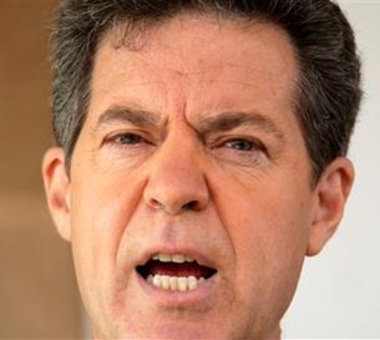Kansas governor pondering religious objections legislation

UPDATED - Topeka, Kan. (AP) — Republican Gov. Sam Brownback said Thursday that he's considering proposing a new religious objections law for Kansas following the U.S. Supreme Court's legalization of gay marriage, and he defended his administration's cautious response to the ruling.
Same-sex couples can obtain marriage licenses in all 105 Kansas counties, but the state is not allowing gay and lesbian spouses to change their names on driver's licenses, nor has it said whether couples can file joint income tax returns. The state has not extended coverage to gay spouses under its health insurance plan for government workers.
Brownback has been a strong supporter of the state's gay marriage ban, which was reinforced in 2005 by an amendment to the Kansas Constitution overwhelmingly approved by voters. In February, he rescinded an executive order issued in 2007 by then-Democratic Gov. Kathleen Sebelius to protect gays and lesbians from discrimination in state hiring and employment decisions, saying legislators should approve such a policy.
The conservative governor said the state will move "as expeditiously as we can" to make changes, but he didn't have a timetable.
"You have to understand and get the mechanisms in place," he told reporters. "We've had meetings with the attorney general, with the relevant Cabinet agencies. We want to make sure to do this right."
Asked whether he'd outline a proposal for legislators next year, Brownback said, "We're looking at that." Lawmakers are out of session for the year.
"We want to make sure that people's religious liberties are protected," he said.
Arkansas and Indiana enacted religious objections laws this year but were forced to change them because of a national backlash, including business groups. In Louisiana, Republican Gov. Bobby Jindal, a GOP presidential candidate, issued an executive order in May to protect opponents of gay marriage after his state's lawmakers refused to enact a religious objections law, and his action is being challenged in court.
The Republican-dominated Kansas Legislature considered a religious objections law last year but didn't pass it, with Brownback, a conservative Catholic, said little during that debate.
Tom Witt, executive director of Equality Kansas, the state's leading gay-rights group, said Brownback is "blinded by his ideology" and said state government should be moving immediately to extend benefits routinely available to straight married couples.
"It's a continued attempt to deny gay and lesbian Kansans our constitutional rights," Witt said. "This is not foot-dragging any more. This is just defiance."
Kansas already has a "religious freedom" law, enacted in 2013, saying that state or local government agencies can't substantially limit someone's exercise of religion without a compelling reason. It allows lawsuits to challenge government actions.
Legislators last year considered providing additional protections specifically for churches, faith-based groups, businesses and individuals citing religious beliefs in refusing to participate in or provide goods, services and accommodations for same-sex weddings.
The measure passed the House but died in the Senate. It provoked national criticism because it covered situations outside of marriage, and opponents said it would sanction widespread discrimination against gays and lesbians, even by government officials.
After last week's U.S. Supreme Court ruling, Senate President Susan Wagle, a Wichita Republican skeptical of last year's proposal, said the state must re-examine its religious objections laws. House Speaker Ray Merrick, a Stilwell Republican, said Thursday that he's sure legislators will respond to the gay marriage decision, though he's not sure how.
By John Hanna, AP Political Writer. Copyright 2015 The Associated Press. All rights reserved. This material may not be published, broadcast, rewritten or redistributed.
The Gayly – July 2, 2015 @ 2pm.





